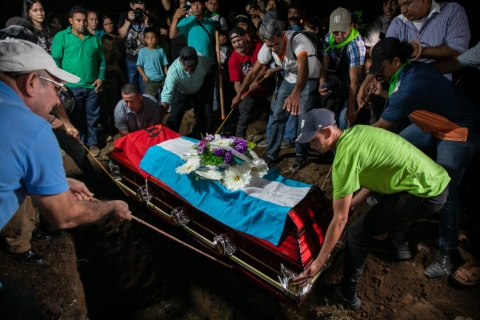
The murder of Juan Lopez, environmental leader in Tocoa, Honduras, is not an isolated incidence, but rather, one more link in a pattern of violence.
The following article was published in the November-December 2024 issue of NewsNotes.
The assassination of Juan López on Saturday, September 15, as he left his church has left the network of environmentalists in Honduras in shock and grief, but perhaps not in surprise.
Juan was a member of the Municipal Committee in Defence of Common and Public Goods of Tocoa (Comité Municipal de Defensa de los Bienes Comunes y Públicos de Tocoa -CMDBCP), a committee formed in 2015 to organize against concessions to an iron ore mining project in the Carlos Escaleras National Park because of the risks the mine posed to rivers and watersheds. The mining concessions were granted to Los Pinares mining company, owned by some of the most powerful families in Honduras.
Juan Lopez’s organization CMDBCP, was awarded the Institute for Policy Studies’ Letelier-Moffitt Human Rights Award in 2019, and Juan Lopez was among the delegation that came to Washington, DC, to receive the award. In his speech, he quoted his compatriot, fellow Honduran and environmental activist Berta Caceres, who was assassinated in 2016.
The CMDBCP had been put on high alert of the dangers its members faced from numerous death threats. In recent months, Juan reported being followed by two men on motorcycles and receiving numerous threats from a local businessperson and a representative of the mining company. The Inter-American Human Rights Commission granted urgent requests of protective measures to Juan Lopez and 29 other activists in the community as early as October of 2023. In fact, Juan Lopez’s assassination marks the fourth murder of a member of the CMDBCP since 2023.
While the details of the case of CMDBCP are particularly concerning, egregious threats against the lives of environmentalists are endemic to the entire region. Central America and Colombia remained the most dangerous places in the world for environmental activists, as seen from the per capita assassination rate documented by Global Witness for the year 2023. Honduras had the ignominious distinction of being the second most dangerous country for environmentalists that year.
Furthermore, Central America, including Honduras, is known as a biological hyperdiversity hotspot, containing 5-12 percent of the world’s total biodiversity. The most dangerous country for environmentalists, Colombia, which saw 79 assassinations in the year 2023, holds ten percent of the Amazon rainforest, the most biodiverse ecosystem on the planet. And yet, Honduras is highly vulnerable to extreme weather events, flooding, hurricanes, and landslides, which are exacerbated by climate change. These regions are irreplaceable and deserving of fierce protection.
Assassinations are only the most concrete evidence of violence towards green activists, and there is no way to quantify the chilling effect that these murders have for those who would stand up for their ecology otherwise. The larger damage of the violence towards environmental groups is immeasurable.
In a new report by the Institute for Policy Studies, descriptively titled “The Corporate Assault on Honduras: Mafia-style investments and the Honduran people’s struggle for democracy and dignity,” tells of some of the factors contributing to Honduras’ uncertainty. Honduras was the second most sued country in all of Latin America after Mexico in cases of international arbitration claims, based on “irregular” investments made after the 2009 coup de état. The claimants in these suits, in many instances, are investors who have had direct or indirect links to criminal networks. As the report summarizes, “the cost to the country is not only economic but also social and political, given that the suits aim to have a ‘deterrent effect’ on regulations and public policies.”
Maryknoll Office for Global Concerns joined a statement, alongside 19 other human rights and faith-based organizations, on the death of Juan Lopez. The statement reads:
“We urge an immediate investigation into his assassination so that the perpetrators are brought to justice, including those who ordered the killing. We call on the [“Libre” political party-controlled government] to strengthen its protective measures for environmentalists and activists and for [Honduran] President Xiomara Castro to keep her campaign promise to end open-pit mining in the country.”
The statement concludes, “the time to change course is now.”
Faith in action
Read the report by the Institute for Policy Studies, “The Corporate Assault on Honduras: Mafia-style investments and the Honduran people’s struggle for democracy and dignity” at https://mogc.info/IPS-Honduras
Photo of the funeral of Juan Lopez, attended by hundreds, on September 2016, by Fernando Destephen, CC, courtesy of Contracorriente.red
